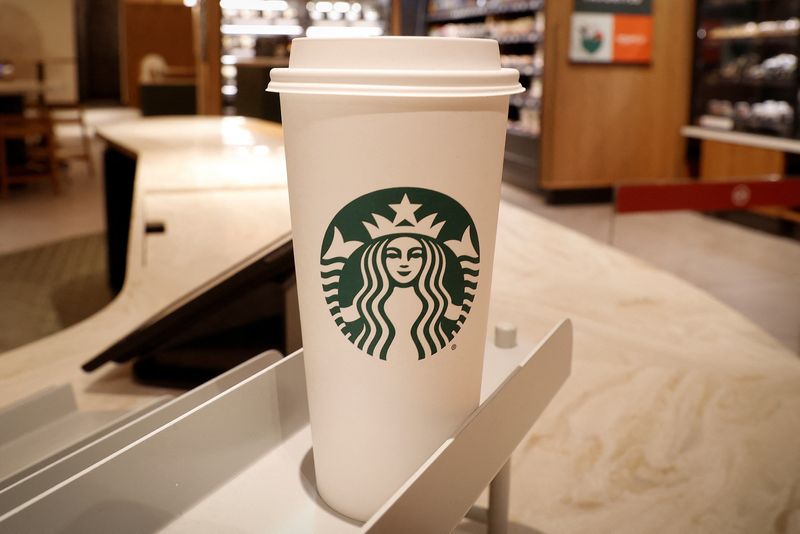By Andrew Chung
(Reuters) -The U.S. Supreme Court sided on Thursday with Starbucks (NASDAQ:SBUX) in the coffee chain's challenge to a judicial order to rehire seven Memphis employees fired as they sought to unionize in a ruling that could make it harder for courts to quickly halt labor practices contested as unfair under federal law.
The justices unanimously threw out a lower court's approval of an injunction sought by the U.S. National Labor Relations Board (NLRB) ordering Starbucks to reinstate the workers while the agency's in-house administrative case against the Seattle-based company proceeds.
The justices ruled that lower courts had used an improper legal standard - one that Starbucks argued was too lenient - to issue a preliminary injunction requested by the agency under a federal law called the National Labor Relations Act.
Such orders are intended as an interim tool to halt unfair labor practices while the NLRB resolves unfair labor complaints. Under that law's section 10(j), a court may grant an injunction if it is deemed "just and proper."
Starbucks had argued that the judge who granted the injunction should have used a stringent four-factor test in deciding to issue that order, similar to the standard used by some other courts and in non-labor legal disputes. This test includes an assessment of whether the side seeking relief would suffer irreparable harm and is likely to succeed on the merits of the case.
Conservative Justice Clarence Thomas authored Thursday's ruling in which the justices unanimously agreed to return the case to the lower court to apply the four-factor test. Liberal justice Ketanji Brown Jackson, in a partial dissent, broke with the other justices on how the lower court should apply part of that test.
Starbucks has contended that under a stricter standard, the case would have come out differently in the lower courts.
President Joe Biden's administration had defended the NLRB's actions in the case. During Supreme Court arguments in the case in April, a Justice Department lawyer said the NLRB seeks injunctions like the one issued against Starbucks in very few "cream of the crop" cases, last year requesting just seven even though it receives 20,000 unfair labor charges annually.
About 400 Starbucks locations in the United States have unionized, involving more than 10,000 employees. Both sides at times have accused the other of unlawful or improper conduct.
Hundreds of complaints have been filed with the NLRB accusing Starbucks of unlawful labor practices such as firing union supporters, spying on workers and closing stores during labor campaigns. Starbucks has denied wrongdoing and said it respects the right of workers to choose whether to unionize.
Both sides in February announced they had agreed to create a "framework" to guide organizing and collective bargaining and potentially settle scores of pending legal disputes.
Starbucks after the ruling reiterated its goal of reaching contracts with union-represented stores this year.
"Consistent federal standards are important in ensuring that employees know their rights and consistent labor practices are upheld no matter where in the country they work and live," the company said in a statement.
In 2022, workers at a Starbucks cafe on Poplar Avenue in Memphis became among the first in the company to unionize. Early in their efforts, they allowed a television news crew into the cafe after hours to talk about the union campaign. Starbucks fired seven workers present that evening, including several who belonged to the union organizing committee.
Despite the dismissals, employees there subsequently voted to join the Workers United union.
The union filed unfair labor charges with the NLRB over the firings and other discipline by managers. The NLRB sought an injunction, accusing Starbucks of unlawfully firing the workers for supporting the union drive and to send a message to other workers.
Lynne Fox, president of Workers United, criticized the Supreme Court's ruling.

"Working people have so few tools to protect and defend themselves when their employers break the law," Fox said. "That makes (Thursday's) ruling by the Supreme Court particularly egregious. It underscores how the economy is rigged against working people all the way up to the Supreme Court."
U.S. District Judge Sheryl Lipman granted the injunction in 2022, reinstating the workers in order to address the "chilling effect" of the dismissals on the unionization effort while the NLRB resolves the case. The Cincinnati, Ohio-based 6th U.S. Circuit Court of Appeals upheld the injunction in 2023.